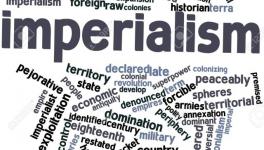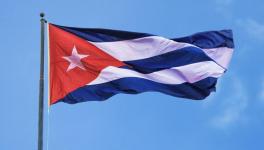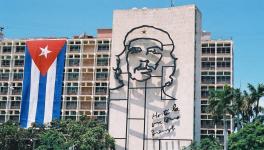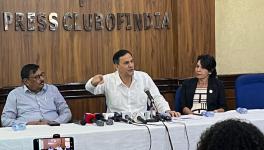Che Guevara’s Legacy
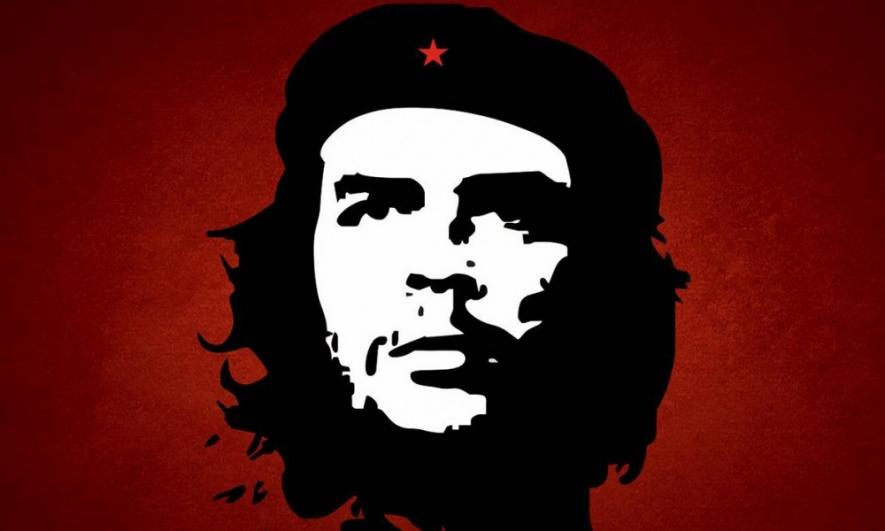
This year marks the 50th anniversary of the assassination of Che Guevara in the Bolivian mountains by the Bolivian military, led by the CIA. Although imprisoned, keeping Che Guevara alive in those days of October, 1967, was a temerity for imperialism even more so in a context where they were just starting to implement their new plans for counterinsurgency and national security that resulted in military coups and military dictatorships in virtually all Latin American countries in the 1960s and 1970s.
The figure of Che Guevara has always been very controversial. Hated by the right-wing and by reactionary forces across the continent. And controversial, even among the progressive and left-wing sectors.
In those years, the left was very dogmatized, and with each thesis, a new group was formed. Each group labeled Che according to their manuals, and some classified him only as an adventurer, an idealist. After all, it was more convenient to follow the bureaucratic and peaceful tradition of some parties that defined themselves as communists. There were those who were frightened by his practice. After all, it was too much to ask of a common militant to follow such boldness. And others even misrepresented his ideas, turning his example into a mere stimulus to a false heroism unrelated to the masses, which was summed up in the thesis of Régis Debray, who argued that "it was enough that a small group of well-armed and willing men, to climb the mountains and create the focus for the exploited masses to follow them. " It was "foquismo."
These were definitely not Che's ideas, not even about the military strategy of taking power. And even in his "Guerilla Warfare" manual, written from his concrete experience in the Cuban revolution, the principles of guerrilla warfare are only present as part of the mass struggle as a means, not an end in itself. In it, he also discusses the need of the various subjective, objective conditions and the correlation of forces, for its triggering.
But, being that Che was so controversial and so misunderstood regarding strategy and tactics, and having been victorious in Cuba but defeated in Congo and Bolivia, what would Che's legacy be?
One cannot idealize Che’s image as if he were a super human. Nor dogmatize him as a single and absolute example. Nor exorcise it, reducing him to a myth. Che represents the synthesis of a revolutionary historical period of our continent. His ideas, his ideals, and his practice formed the symbolism of the feelings and the practice of a whole revolutionary movement, of various popular organizations in Cuba and throughout Latin America.
Therefore, when referring to it, it must be borne in mind that he has become a political reference because he represents a synthesis of the historical experience of various Latin American peoples.
And perhaps his figure was as strong as a synthesis, because, as historians and contemporaries say, Che was one of the few revolutionaries who managed to live intensely, coherently and daily, everything he thought.
"My father, - said Aleidita in a statement -, "sought to live every day coherently with what he thought."
And it is in this consistent, everyday practice that one finds Che's greatest legacy for the present generation of idealists and revolutionaries.
Briefly, one can identify ten great values that would represent Che's legacy in the history of Latin America.
1. Humanism
Man should be the main objective.
Your well-being, your self-improvement as a being that seeks to perfect itself, that seeks happiness, that seeks to live in a just society. The struggle, the party, the guerrilla, are always interpreted by Che as means. The aim is to achieve a society of free and fraternal men. That is why, even after taking power, in Cuba’s case, there was an endless struggle for the construction of a different society. In this Guevarian humanism, Marx's ideals are deepened, and the more generous view of the main objective of a social revolution is restored. Contrary to the practice of some leftist parties, which have transformed the conquest of power, the control of the state and the strengthening of its organization in an end in itself.
This humanism is also present when he defends the idea that what makes a person a "true revolutionary" is when that person moves permanently by a deep feeling of love for his peers.
2. Rebelling Against any Social Injustice
This phrase has become a principle of practice for any revolutionary. Che argued that the practice of any person claiming to be revolutionary should be enough indignation to rebel against any social injustice felt against any human being anywhere in the world or under any circumstances.
In this principle, the fundamental idea of social relations conceived by Che is present. The sense of equality and justice. And, at the same time, the rebellion and the courage to encourage all individuals to seek equality, rebelling against any situation of injustice. This view breaks the individualistic conception of caring only about oneself or one's friends. And it breaks with the illusion that to be revolutionary, it is necessary to have theory, to be in a revolutionary organization. Take pride in dogmas and symbols and forget about everyday practice, where, at any moment and in small things, one can be a great revolutionary as we fight against these injustices. Against these situations of oppression that classist societies and capitalism produce.
3. Latin-Americanism
The idea of the Latin American identity of the peoples who inhabit this continent, despite the cultural and ethnic differences, have been present since the struggles for independence. Quite often Simon Bolivar is mentioned, and especially Jose Marti. These ideals are present in many literary works, in political speeches and party programs, in all the countries of the continent. But surely, Che’s figure was the bluntest expression of this character, by his life example.
History reserved for him the opportunity to be born in Argentina, to have traveled the continent by land and to have gotten to know its illnesses more closely. To fall in love with the cause of all the Latin American peoples. Thus, he was able to devote himself with the same passion in Guatemala, in the preparation of the Granma, in Mexico, in the mountains of Cuba. In the revolutionary government, on the UN platform, and on the Bolivian highlands.
His life put into practice the ideas of Martí. And it consolidated this Latin American spirit. Because it has contributed to the understanding that the causes of the people’s social problems in different countries are the same. That the imperialist role of the United States oppresses all. And that the solution, in the long run, will unite all in a similar, Latin American path. An isolated country won’t be able to build a just and fraternal society in Latin America by itself. Even in the case of the victory of the Cuban revolution, one should note the sacrifices imposed on the Cuban people by the North American siege and the recent infeasibility of other revolutions in Central America, the Caribbean, and South America.
4. The Missionary Spirit
The missionary spirit present in Che's ideas and practice is based on the feeling of solidarity, not adventure. Che used to say that "the most beautiful quality of a person is the feeling of solidarity." And it was with this feeling that he preached the missionary spirit. Get rid of everyday tasks, of the easiness of organized life. And be willing to give up this easiness and go to other places, other villages, and even other countries. Contribute in some way, with humility, so that other people can live better. This missionary spirit took him to many places. But always with the same feeling of solidarity. Never to teach, to give orders, to impose. Or take some personal advantage.
This feeling of solidarity is what has stimulated thousands of Cuban revolutionaries to contribute with their knowledge, with their goodwill, in the field of healthcare, of techniques, with other peoples, in almost every continent.
5. The Spirit of Sacrifice
The spirit of sacrifice was not a moralistic, false, or religious discourse, to seek paradise in eternal life. Not a masochistic deviation. But it was part of life. The worst task, in any job or mission, was assumed by Che. And he preached that every militant, that every revolutionary should assume this obligation for himself. With these values, one would have enough morality to serve as an example to the all of the people and the construction of a different society.
6. The Example of Work
Work has always been seen by Che as the transforming force of men, as the basis for building all wealth in society. But above theoretical and philosophical concepts, his legacy is to have practiced the basic idea that "no one can ask another to do something without doing it first."
That’s why, on many occasions, he was the first to do the tasks, the first to start doing the job. First, he tried to do it himself, and just then he would ask if others could also do it and move on.
This spirit is present in Che's enormous contribution to the organization of mass work, in the form of task-forces, where the entire adult population was called to engage.
This same spirit was present in the political planning and in the debates with Cuban workers and Cuban society in the process of building socialism. It shows that a more just society, with better well-being, is not built with discourses, or only ideals, but that it depended, fundamentally, on the increase in the production of goods, of commodities, of wealth. And that would only be possible with much work. That is, a more advanced and more just society would only be achieved with more work from the present generation, to build a more dignified future for future generations.
7. The Dispossession of Material Goods
Che held the most important positions in the Cuban state. He was Minister, President of the Central Bank, took part in countless international delegations representing the Government and the Cuban people. He could have settled in the positions and the quiet life that his trajectory assured him.
When he said goodbye to his children, he was careful to point out that he left them no material goods, and hoped that the revolutionary state would guarantee them the same welfare and education that it should guarantee to all the children of the people.
His habits were simple and modest. Almost Franciscan.
And this spirit of the person that does not cling to material goods as if they were the only source of happiness, was present in his preaching.
It counteracted the need of man to have access to knowledge, cultural goods, education and a life of solidarity and equality as the basis of happiness. Goods related to the basic needs of man are fundamental. But the practice of individualism, of selfishness, of the accumulation of goods as ostentation of social differentiation would undermine morality needed for the construction of a more just society.
This principle is also based on the practice stimulated by Che, of voluntary work. He saw in voluntary work, carried out in the time off, on Saturdays, Sundays, holidays, a way of practicing this detachment for material things, and the way of practicing concrete acts of social solidarity. He also believed that the great concrete problems of Cuban society would only be possible to resolve more quickly if there were a donation, a greater surrender of all in the carrying out of voluntary unpaid work.
8. Belief in the Power of the Masses
The popular force and transformative capacity of the organized masses are present in every political thought of Che. Even in the theorizing of military strategies, contrary to the diffusion “foquismo," Che preached that the revolutionary victory would only be possible if he could organize a true popular army, of the whole people.
The deviations of putchtism or the heroism of a small group that could free the people were never present in his ideas.
This same conception is present by allying the force of the masses with the spirit of sacrifice and voluntary work. And so, many efforts were made to solve concrete problems of the population. From public cleaning, the construction of popular housing, to the cutting of sugarcane and the defense of the motherland, when Cuba, for example, was invaded by military forces organized by the United States in the famous episode of the Bay of Pigs, and in 72 hours, with the mobilization of all the people in arms, managed to defeat and arrest all the invaders.
9. The Relationship of Leaders x Masses
The daily practice of Che's example also brings an important legacy as to how he related to the masses. He defended and practiced the necessary bonding of the leaders with the masses. He was always among them. And he tried to listen to their yearnings, problems, difficulties, and criticisms of the revolutionary process.
He had an essentially anti-bureaucratic, anti-cabinet, anti-avant-garde, anti-director practice. Avoiding and fighting that an organized core of the party could know everything about the people and choose the best way for it. Being always in the midst of the people was the best way to make fewer mistakes.
10. The Education of Cadres
The experience of building socialism, the experience of the people's administration of a revolutionary state under conditions of underdevelopment, led Che to devote much thought to the need for the education of cadres. There are many reflections recorded in speeches, articles, essays, on this issue. He saw the need to educate cadres as vital for the revolutionary process. And again, it manifests its connection with the popular force, in defending the idea that a policy of cadres was a policy necessarily directed at the masses. So that the masses, especially the youth, could form as many people as possible as revolutionary militants, within the technical and political needs. But, above all, that with a political, moral and cultural development, they represented the practice of values of the new man that would serve as an example to the whole mass.
He argued that the cadres should be highly disciplined. Technically prepared, with a passion for the study and scientific knowledge. Willing to tackle any task. With capacity to analyze the problems and their causes, and with enough creativity to seek a solution. But, above all, he should earn respect for the workers and the people, for his example and his affection and dedication to his peers.
In this way, people would become examples, and by way of example, they could be called revolutionary cadres.
Conclusion
The figure of Che Guevara is still so present in our midst, fundamentally because of the legacy that he left us. The living situation of the peoples of Latin America has not changed. The productive forces developed. But the social and concrete problems of our people continue.
It is up to the popular organizations that claim to be revolutionary to reflect on this legacy. Look for the universality that exists in it, regardless of the social category, the environment or the country in which it operates.
Believing in Che's legacy does not mean to copy strategies or tactics of power grab used in Cuba or Bolivia. Each country, each people, each situation will have its own strategy and tactics, determined by objective, subjective conditions and by the correlation of forces. To believe in Che is, above all, to feed the possibility of revolution permanently. To make the revolution every day. By our practice, by the permanent encouragement of the trust in our ideals, and by the certainty that it is possible to defeat the oppressors (internal and external) and that one day we will build a more just and fraternal society. And certainly, as Martí and Che Guevara dreamed, Latin American.
Disclaimer: The views expressed here are the author's personal views, and do not necessarily represent the views of Newsclick.
Get the latest reports & analysis with people's perspective on Protests, movements & deep analytical videos, discussions of the current affairs in your Telegram app. Subscribe to NewsClick's Telegram channel & get Real-Time updates on stories, as they get published on our website.










